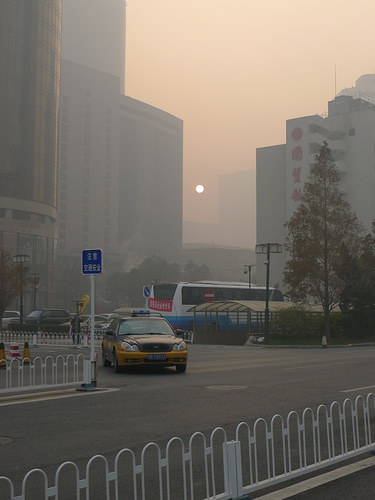Air Pollution in China and its Effects on Canada
Something in the Air
By Megan Gartrell, Staff Writer
It was a dark day in China, literally. The streets were masked in a thick, charcoal haze that shut down roads and grounded flights. Citizens were told to stay indoors, causing Internet users to coin the terms, “airmageddon” and “airpocalypse.” Like a scene from a horror movie, windows were sealed, cars sat abandoned and an eerie silence descended.
China can no longer skirt the issue of the state of its air quality. What has been referred to as “haze” or “fog” by the Chinese government in the past has now been recognized for what it is: toxic smog. In the past month, air pollution in China’s second largest city, Beijing, has soared past levels considered hazardous by the World Health Organization (WHO).
[pullquote]What has been referred to as “haze” or “fog” by the Chinese government in the past has now been recognized for what it is: toxic smog.[/pullquote]
Much of the pollution stems from a growth-first development strategy by China’s government. China set some lofty goals and has succeeded in producing both the world’s second largest economy and the globe’s leading creditor nation in less than a generation, but at what cost?
This full-steam-ahead approach towards industrialization has brought in its wake a host of problems – the most visual being the country’s air quality. Beijing’s pollution monitoring center warned residents to stay indoors during a two-day period when pollution reached 30 to 45 times above recommended safety levels.
Data posted from the monitoring center shows particulate matter measuring less than 2.5 micrometres in diameter (PM 2.5) had reached more than 600 micrograms per cubic metre of air. According to WHO, the recommended daily level for PM 2.5 is 20 micrograms per square metre.
These levels of PM 2.5 are extremely dangerous because particulate matter that small can lodge deep into the lungs and enter the bloodstream. Respiratory infections, asthma, lung cancer, and cerebrovascular disease are just some of the potential ailments caused by long-term exposure.

Courtesy of egorgrebnev
In an article with the National Geographic News, Michal Krzyzanowski, an air quality adviser to the WHO regional Office for Europe, said, “Air pollution is estimated to cause approximately two million premature deaths worldwide per year.” As a result of the record-breaking pollution, hospitalization rates for heart attacks and respiratory problems climbed and half a million facemasks were sold in two days.
The angry reaction of Chinese citizens to the extreme pollution illustrates that this issue is taking precedent above other pressing problems such as corruption and censorship. The discontent of the people living in cities like Beijing, and the air itself, makes it clear that growth at any cost has lasting effects.
Small Steps Toward Improvement
There have been initiatives put into place by China. In direct response to the recent crisis, Beijing’s city government ordered factories that produce heavy pollutants to suspend production and told government departments and state-owned enterprises to reduce their use of cars by a third. China has improved standards for vehicle and factory emissions, converted urban-heating systems from coal to gas and invested in sources of renewable energy.
It has taken steps on the global stage as well. China is a member of the group of Eight (G8), along with Canada, France, Italy, Russia, the United States, the United Kingdom and Germany. Back in May of 2012, the G8 leaders agreed to take concrete measures to reduce the emissions of short-lived climate pollutants, including black carbon (soot), methane, ground-level ozone and hydrofluorocarbons (HFCs) at a summit hosted by President Obama at Camp David. They were also in agreement to a plan to phase out fossil fuel subsidies and limiting the world’s increase in temperature to less than two degrees Celsius over pre-industrial levels.
China signed just as all the other countries did.






























Share the post "Air Pollution in China and its Effects on Canada"